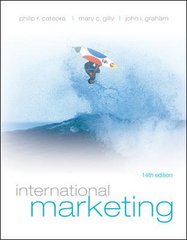Question
Suppose that an individual's utility function for consumption, C, and leisure, L, is given by U(C,L) = C0.5L0.5 This person is constrained by two equations:
Suppose that an individual's utility function for consumption, C, and leisure, L, is given by
U(C,L) = C0.5L0.5
This person is constrained by two equations: (1) an income constraint that shows how consumption can be nanced, C = wH + V,
where H is hours of work and V is nonlabor income; and (2) a total time constraint (T = 1)
L + H = 1
Assume V = 0, then the expenditure-minimization problem is minimize C w(1L) s.t. U(C,L) = C0.5L0.5 = U (a)Use this approach to derive the expenditure function for this problem.
(b)Use the envelope theorem to derive the compensated demand functions for consumption and leisure. (c) Derive the compensated labor supply function. Show that Hc/w > 0.
In working following parts it is important not to impose the V = 0 condition until after taking all derivatives. (d)Assume V 6= 0, determine uncompensated supply function for labor and compare with the compensated labor supply function from part (c). (e)Determine maximum utility, U, using the expenditure function derived in part (a), assume V = E, (f) Use the Slutsky equation to show that income and substitution eects of a change in the real wage cancel out.
Step by Step Solution
There are 3 Steps involved in it
Step: 1

Get Instant Access to Expert-Tailored Solutions
See step-by-step solutions with expert insights and AI powered tools for academic success
Step: 2

Step: 3

Ace Your Homework with AI
Get the answers you need in no time with our AI-driven, step-by-step assistance
Get Started


